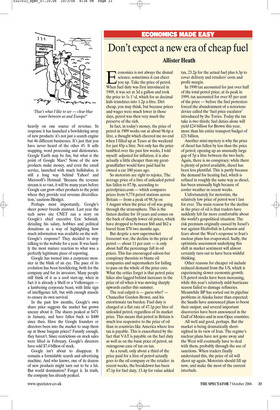Don’t expect a new era of cheap fuel
Allister Heath
Economics is not always the dismal science; sometimes it can cheer you up. Take the price of petrol. When fuel duty was first introduced in 1909, it was set at 3d a gallon and took the price to 1s 11/2d, which for us decimal kids translates into 1.2p a litre. Dirt cheap, you may think, but because prices and wages were much lower in those days, petrol was then very much the preserve of the rich.
In fact, in today’s money, the price of petrol in 1909 works out at about 96.6p a litre, a thought which cheered me no end when I filled up at Tesco at the weekend for just 85p a litre. Not only has the price tumbled over the past few weeks, I told myself: adjusted for inflation, it is also actually a little cheaper than my greatgrandfather would have paid had he owned a car 100 years ago.
So motorists are right to rejoice. The average price of a litre of unleaded petrol has fallen to 87.9p, according to petrolprices.com — which compares prices from 9,774 petrol stations across Britain — from a peak of 98.5p on 1 August when the price of oil was going through the stratosphere. This is the fastest decline for 18 years and comes on the back of sharply lower oil prices, which have dropped to between $60 and $62 a barrel from $78 two months ago.
But despite a new supermarket forecourt war, the decline in the price of petrol — about 11 per cent — is only about half the percentage fall in oil prices. This has encouraged saloon-bar conspiracy theorists to blame oil companies and supermarkets for failing to pass on the whole of the price cuts. What the critics forget is that petrol price hikes also lagged behind increases in the price of oil when it was moving sharply upwards earlier this summer.
The real culprit is — guess who? Chancellor Gordon Brown, and his extortionate tax burden. Fuel duty is charged at a flat rate of 47.1p per litre of unleaded petrol, regardless of its market price. This means that petrol in Britain is much less responsive to the price of oil than in countries like America where less tax is payable. This is exacerbated by the fact that VAT is payable on the fuel duty as well as on the basic price of petrol, an outrageous case of tax on tax.
As a result, only about a third of the price paid for a litre of petrol actually goes to the oil company or the retailer: in recent weeks, the breakdown has been 47.1p for fuel duty, 13.4p for value added tax, 23.2p for the actual fuel plus 6.3p to cover delivery and retailers’ costs and profit margin.
In 1990 tax accounted for just over half of the total petrol price; at its peak in 1999, tax accounted for over 85 per cent of the price — before the fuel protesters forced the abandonment of a notorious device called the ‘fuel price escalator’ introduced by the Tories. Today the tax take is two thirds; fuel duties alone will yield £24 billion for Brown this year, more than his entire transport budget of £21 billion.
Another mini-mystery is why the price of diesel has fallen by less than the price of petrol, opening up an unusually large gap of 5p a litre between the two fuels. Again, there is no conspiracy: while there is plenty of petrol available, diesel has been less plentiful. This is partly because the demand for heating fuel, which is refined in roughly the same way as diesel, has been unusually high because of cooler weather in recent weeks.
Unfortunately for motorists, the relatively low price of petrol won’t last for ever. The main reason for the decline in the price of oil is that traders have suddenly felt far more comfortable about the world’s geopolitical situation. The risk premium originally caused by Israel’s war against Hezbollah in Lebanon and fears about the West’s response to Iran’s nuclear plans has evaporated. Sadly, the optimistic assessment underlying this shift in market sentiment will almost certainly turn out to have been wishful thinking.
Other reasons for cheaper oil include reduced demand from the US, which is experiencing slower economic growth. US petrol stocks have been increasing, while this year’s relatively mild hurricane season failed to damage refineries. Meanwhile BP has sorted out its pipeline problems in Alaska faster than expected; the Saudis have announced plans to boost their output; and several important discoveries have been announced in the Gulf of Mexico and in non-Opec countries.
All well and good, perhaps. But the market is being dramatically shortsighted in its view of Iran. The regime’s nuclear plans have not gone away and the West will eventually have to deal with them, probably through the use of sanctions. When traders finally understand this, the price of oil will shoot up again. Motorists should fill up now, and make the most of the current interlude.


















































































 Previous page
Previous page